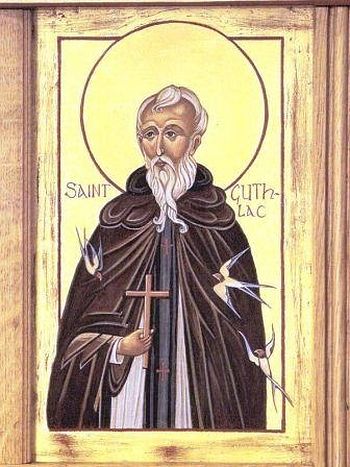
St. Guthlac of Crowland (c. 673-714) is one of the greatest hermit-saints of the early English Church and is considered to be the most popular pre-Norman English saint after St. Cuthbert. Orthodox Christians call him “the English St. Anthony the Great”. Crowland Abbey Church, situated in the quiet village of Crowland in Lincolnshire close to the Cambridgeshire border in the district known as the Fens—the site of ascetic life of Guthlac—attracts Orthodox and other Christian pilgrims every year. The Fens is a low, flat area of parts of present-day Lincolnshire, Cambridgeshire and Norfolk, formerly well-known as a dominantly marshy region, though the swampland was reclaimed chiefly from the 17th to 19th century.
As is generally known, numerous desert fathers in ancient times, especially in Egypt, lived in deserts. However, the hermits of the British Isles chose small islands, shores, cliffs, sometimes forests, mountains and hills as their “deserts” as Britain does not have natural deserts. Guthlac was unique even for English saints as he preferred to live as a hermit, surrounded by dangerous and impassable bogs and swamps from all sides. His spiritual labors and experiences in all respects resembled the life of the venerable monks of the Egyptian deserts.
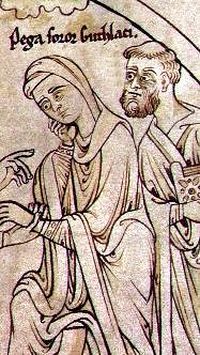 St. Guthlac and his sister St. Pega
St. Guthlac and his sister St. Pega
The birth of the great hermit Guthlac was accompanied by marvelous miracles. The parents and all the relatives felt that this child would surely become a man, great in the eyes of God and in the eyes of men. Guthlac was an obedient boy; he avoided all the usual childish games and pranks or idle talks. He grew into a very clever adolescent, his face always shone with a particular spiritual joy; he was innocent in all his activities. However, with time his temper changed very radically: he became more and more inspired by deeds of contemporary heroes and those of the old times. A sort of belligerent mood awoke inside him. It was said that at that time Guthlac for some time served in the Mercian army. At the age of 15 Guthlac formed his own gang and together with other youths gave himself up to banditry, robbery, bloody raids on neighboring settlements and other horrible crimes.
He and his band then became a real plague for the surrounding districts and their population. He spent about nine years in such grave crimes and brigandage until one day he suddenly remembered about the Lord and a very strong awe and fear of God appeared in his heart. As was the case with many other former thieves who, realizing their way of life, repented and served the Lord and people for the rest of their lives, Guthlac was spiritually transformed, confessed all his previous sins to God and firmly decided to be His faithful and ardent servant. He gave back all his loot to the people and called upon his gang members to do the same. After that, following the Lord’s revelation, Guthlac came to the double Monastery of Repton in the present-day county Derbyshire which was in Mercia. He wished to start serving Christ as a monk there.
At that time the monastic house was ruled by Abbess Aelfrith. Guthlac was tonsured and lived for around two years there. This monastery was the burial place of many members of the Mercian royal family. It existed for many years afterwards and was connected with several other important saints. The Abbey Church of St. Wistan with its early English crypt and the abbey ruins in the village of Repton are a site of pilgrimage to this day. Guthlac lived at Repton in extreme abstinence. First the brethren were not very friendly with him because he totally refused any alcohol drinks but then, seeing his genuine ascetic life, love and kindness, they became his close spiritual friends. In Repton Guthlac soon learned the whole Psalter by heart. He studied the Gospel and teachings of the Holy Fathers very thoroughly and zealously practised everything he found in their instructions. Once he read the Lives of the Egyptian desert fathers he began to have a strong and fervent desire to imitate their way of life in order to be closer to Christ Whom he loved most of all. So the saint resolved to live alone in the wilderness, somewhere in the back of beyond. With the blessing of the holy elders the ascetic began to search for such a place.
He found some local people in the Fens and one of them, named Tatwine, showed him a small, uninhabited isle right in the middle of this extreme swampy region. Also Tatwine told Guthlac that nobody had been able to live there because of hordes of evil spirits, or demons, who dwelt there. Guthlac at once felt that it was his calling to live on that very spot and to struggle with these demons there in the Name of the Savior. So at the age of about 26 Guthlac settled on this tiny and dangerous isle, called Crowland, and he stayed there as a true hero, the warrior of Christ, for the remaining 15 years of his life. By Divine providence, Guthlac arrived on Crowland on the feast-day of the Holy Apostle Bartholomew (August 25) and this saint from that time became his main patron.
The Life relates how this Apostle of Christ appeared to Guthlac more than once throughout his solitary life in Crowland, several times protecting him from demons and once even giving him a scourge for the use as a defensive weapon against the attacks of the evil one. Guthlac never left his beloved hermitage though sometimes he had visitors who could reach Crowland by boat through the narrow way on the River Welland. There was an old tumulus in Crowland which had partly been dug out by treasure hunters and there was a large basin with clean water beside it. There Guthlac built a little cell and a chapel for himself. The saint wore only animal skins and ate no more than once a day. He had only barley bread as his food and only water for drink. Most of the day he prayed and gave himself up to Divine contemplation.
The hermit had numerous temptations and harsh tribulations during his life on that isle. The wretched spirits vexed him for years until he once finally drove them away from the isle. It is supposed that these were also attacks made by local Britons who had taken refuge in the Fens and who wanted to make Guthlac leave Crowland. The saint usually won his battles against the temptations by the sign of the cross, by reading the Psalter, especially Psalm 90, and by petitions for “emergency” help to his patron-saint, St. Bartholomew. Among his most frequent temptations were despair, the memory of his former sins that “would never be forgiven him” and the memory of the outside world—with much courage he struggled with all these thoughts and every time with the help of God was the winner. Many times angels appeared to him for consolation and in the final years of his life an angel descended to his cell every night and conversed with him till the morning.
Here are several examples from the Life of Guthlac illustrating his warfare with the demonic powers. Once two demons appeared to him and spoke with the hermit in a very friendly way, though flattery and meaningless instructions were seen in their words. By these sly speeches they intended to deceive the hermit and to lead him into self-delusion. They said how they honored his self-denial and hard labors for the sake of Divine service. They also recommended him to fast six days a week and to relax his fasting and rest more on the seventh day. The saint, ignoring them, cried to the Lord imploring Him to protect him: and the demons disappeared like smoke.
Another time Guthlac was praying in the quiet of the night. Suddenly a multitude of wretched spirits approached him. Their appearance was indescribably ugly, they uttered horrifying and terrible noises and soon they filled up all his dwelling. The demons then seized the man of God and grabbed him to the bog and dipped him into the dirty water. Then they threw him into a thicket of brambles so his body was all bleeding. The saint prayed unceasingly and relied on the help of God. Then they beat him with iron bars and commanded him to go away from that island forever. But Guthlac did not heed their threats and pledged to remain there despite their attacks. After that the demons on their ugly wings raised him high up into space where he felt cold and dark. Next he felt that they threw him into hell where there was only fire, torture, suffering and thousands of demons. There he saw how evil spirits tormented the souls of unrepentant sinners and they were about to start tormenting him as well. The holy man exclaimed that he was not afraid of the cursed spirits but he was waiting only for the will of God, his only Master. Suddenly the Holy Apostle Bartholomew appeared before him and the demons scattered like dust. With the help of the apostle the saint was returned to his cell where angels sang him wondrous songs.
One day in the middle of the night demons burst into the saint’s hut and set it on fire (with a phantom fire). The next moment they started beating the ascetic with spear points. Guthlac immediately started singing the verses from the Psalter and the demons vanished with their fire. In the next case, as the man of God was reading his evening prayers he suddenly heard the lowing and roar of wild animals. He then saw hideous creatures that resembled beasts and snakes that were drawing near him. A lion’s muzzle threatened him with its fangs, then something like an enraged bull with a bear’s head followed it. All of them howled and grunted very loudly. The soldier of Christ armed himself with the shield of faith and with the sign of the cross made all these demonic powers run away.
Finally, peace came and following many years of struggle the tempters left that site forever and the place since then became holy. As a reward for his tireless and fearless labors for the glory of the Lord, Guthlac was granted with great wisdom, the spirit of prophecy, clairvoyance, and ability to heal many diseases and to expel demons from possessed people. His Life tells stories how Guthlac saw the future as if it were the present; saw the events that were occurring at a great distance from him; saw the thoughts and intentions of hearts of many people; was a very close friend to wild animals - beasts, birds and fishes - he always supported, fed and protected them and the nature, in return, served him as its master.
With time the fame of Guthlac, the extraordinary great ascetic and man full of the grace of God, spread all over Mercia and finally all England. Though the saint never left Crowland several other ascetics and future saints became his disciples. More and more people flocked to his hermitage: the young and old, the sick and suffering, poor and rich, peasants and nobles: all flocked to Guthlac and received bodily and spiritual healing, good advice, and consolation. Sinners received heartfelt instructions and changed their way of life. The names of the closest disciples of Guthlac are Cissa, Bettelin (both of them were locally venerated as saints), Egbert and Tatwine.
The story with St. Bettelin (also known as Beccel) is remarkable. As a priest Bettelin decided to come to Guthlac of whom he had heard very much and to ask his permission to stay with him forever on the island as his servant. But due to his spiritual weakness the priest was caught by the wretched spirit and decided to kill Guthlac, thinking that in this case he would abide in his dwelling and the faithful would venerate him instead. But the vicious thoughts of men were open to Guthlac and when Bettelin came up to him the saint said the first: “Why have you, dear brother, allowed the evil spirit to conquer your mind? You have been deceived by him. Turn away from these artful designs and perfidious tricks of our common enemy”. Bettelin repented and in tears promised always to listen to the saint’s words and the saint forgave him and kindly promised to guide him.
Guthlac’s life recounts that two ravens used to live on Crowland and they much vexed the saint because they stole many small objects and (unlikely other creatures) did not listen to his commands. But Guthlac accepted their behavior with humility, showing the example of patience. Once a certain monk came to Guthlac and, having made notes on paper, left. Soon he returned but did not find the paper. The saint realized that they had been stolen by the ravens. He suggested the monk take a boat and row towards a tiny lake, while himself he prayed. The monk reached the lake and found his paper safe, lying among the thicket of reeds, as if someone had purposely placed it there.
Another time an ascetic called Wilfrid together with the future king Ethelbald of Mercia decided to pay a visit to Guthlac. Arriving at Crowland, they left Wilfrid’s gloves in the boat. After sweet conversations on spiritual themes Guthlac asked them whether they had left anything in the boat, knowing already that one of the ravens had taken the gloves. The guests confirmed this and when they left his cell they saw the raven sitting on its roof with one glove in its beak. Guthlac commanded it to obey and the bird let it fall on the ground. Meanwhile three other guests arrived by boat and passed Wilfrid his other glove saying that a raven had dropped it as they were sailing nearby.
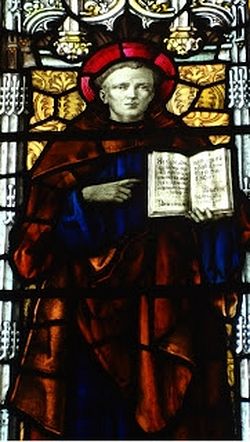 A stained glass of St. Guthlac
A stained glass of St. Guthlac
There lived a very pious youth who honored and helped his parents. But a wretched spirit got into him and the lad went mad. The wicked spirit seized his mind and will so the young man scratched and bit himself and tried to attack anyone who approached him. His family members tied him up and took him to a certain monastery where elders prayed for him for very long, but to no avail. Frustrated, the people did not know what to do. At that time someone told them that among the marshes, in Crowland, there lived a holy monk named Guthlac whose fame as wonder-worker spread far and wide. With great difficulty, but with hope for Divine protection, they took the young man to Guthlac. The man of God prayed in his chapel above the possessed youth for whole three days and in the end, sprinkling him with holy water, delivered him from the evil spirit forever.
Another man named Ecga also suffered a great deal from the unclean spirit. His state was so bad that he did not even understand what was happening to him. His kinsmen took him to Guthlac. The latter met them with Divine love, girded the sick man with his belt and the demon left him in the same minute. One day an abbot who was Guthlac’s spiritual friend decided to visit him. Two monks from his monastery joined the abbot but on the way they asked him to permit them go and do one very important and urgent thing. When the abbot was conversing with Guthlac, the latter unexpectedly revealed him that his monks were not engaged in a pressing matter, but were visiting a widow with whom they drank strong alcoholic drinks.
On his return to the monastery the abbot asked the two monks what they had done and then put them to shame when they declined to confess. The monks prostrated themselves in tears and sincerely asked forgiveness. Another day two monks went to see Guthlac and before arriving decided to hide two flasks with beer that they carried under the grass. The saint greeted them with fatherly love, gave them instructions on salvation and then genially asked them: “Why did you hide the flasks with beer under the grass and did not bring them with you?” Ashamed, the monks bowed to him and asked for his blessing.
A man named Offa once decided to come and see Guthlac. While he was making his way through a thicket in the darkness a large thorn penetrated his foot. The foot began to swell badly and the man with great difficulty limped to the hermit’s island. Guthlac saw him and immediately gave him clothes to put on. As soon as Offa had done this, the thorn came out of his foot and flew away a great distance. Receiving spiritual consolation, Offa departed joyful and healthy. Once a bishop named Hedda who venerated Guthlac very much decided to visit him and offer him ordination to the priesthood. One of Hedda’s companions, an intelligent young man, during the journey boasted that he would come and (using his knowledge and experience, received among holy men in Ireland) find out whether Guthlac was a true servant of God or not, whether he worked miracles through the powers of Holy Spirit or the power of Satan.
When Hedda arrived, they started talking and were soon impregnated with the vivifying power of the Gospel. Guthlac was so eloquent and wise and the spiritual light of Christ shone in him so brightly that it seemed to everybody that not a man, but an angel was speaking in front of them. Hedda implored Guthlac to accept his offer to become a priest and Guthlac agreed, saying that it was the will of God that he should serve Him in the altar. During the common meal Guthlac suddenly addressed the above-mentioned young man and said: “What will you say, brother, regarding the priest of whom you pledged to find out whether he was good or bad?” The young man prostrated himself in front of the saint weeping and Guthlac embraced him as a sign of forgiveness. Thus, Guthlac was ordained priest.
Shortly before his repose Abbess Edburga of Repton (whose relics were later translated to Southwell Minster in Nottinghamshire) who loved and venerated Guthlac sent him a shroud and a leaden coffin that she had prepared herself. She implored him to accept these gifts for Christ and she also asked him, knowing his prophetic power, to reveal who would be the following abbot of Crowland after him. Guthlac with humility accepted her gifts and predicted that the next abbot would be a man who then was still among the pagans but who was destined to come shortly and take baptism (he meant St. Cissa)—and this prophecy was fulfilled in due time.
Not long before Guthlac’s repose the future king Ethelbald visited him again. At that time he was persecuted by the reigning king and abandoned by everybody. Guthlac encouraged him, saying that God would help him to succeed to the throne, but for this he should be patient and indulgent to others, to forgive all his enemies. “Do not fear, but be steadfast, for the Lord is your Helper”. This phrase he used to repeat to others as well, encouraging them to put their hope in God alone in difficult situations. Notably, soon after his death Guthlac appeared to Ethelbald in a vision and reassured him again and repeated his promise. And soon Ethelbald became king and in gratitude for Guthlac’s miraculous help he ordered the building of a monastery on the site of the heroic spiritual battles of Guthlac.
Eight days before his repose Guthlac fell seriously ill. He started preparing for his meeting with the Creator. He fell ill in Holy Week and died on the Bright Wednesday 714. His faithful servant Bettelin was with him during the days of his sickness. On Easter Sunday in spite of his grave illness Guthlac offered up thanks to God and served the Liturgy, after which he delivered an extremely inspired sermon. The day before his demise Guthlac gave his last instructions to Bettelin and ordered him upon his death to go to his sister’s hermitage and ask her to arrange his funeral. Right before his death Guthlac took communion for the last time and took his last breath. At the same moment the whole of his cell was filled with the sweetest aroma, everything around was lit up with an unearthly light (in comparison with which the sun was dusk) and the air was filled with the sound of angelic singing.
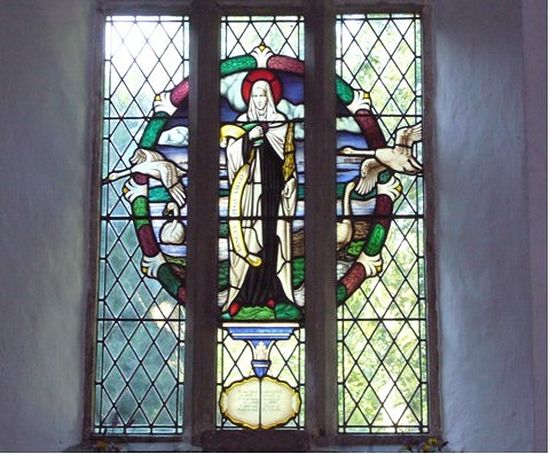 A stained glass image of St. Pega inside the Peakirk Church
A stained glass image of St. Pega inside the Peakirk Church
On the same day Bettelin came to the hermitage of Pega, Guthlac’s sister, who had lived for many years as an anchoress in a place now called Peakirk in present-day Cambridgeshire near the city of Peterborough. (Today this village, which means “Pega’s church”, has a parish church dedicated to St. Pega). Both Pega and Bettelin then sailed down the Welland to Guthlac’s hermitage. It was said that on the way Pega cured a blind man in the present-day town of Wisbech in Cambridgeshire which indicates that the sister of such a great saint was a wonder-worker as well. On their arrival in Crowland the companions discovered that the whole island and the saint’s dwelling were covered with the brightest light that only could be imagined and the fragrance around could only be compared with ambrosia and honey. Pega buried the body of her saintly brother in his chapel on the third day of his death, and she inherited his personal Psalter and scourge for casting out demons which she was later to donate to Crowland Abbey and they were kept there as great relics.
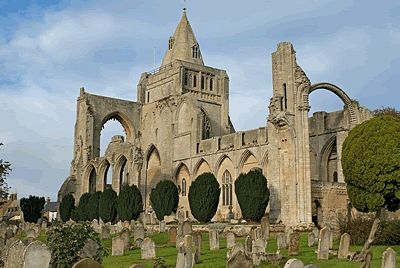 Crowland Abbey in Lincolnshire-the site of St. Guthlac's hermitage
Crowland Abbey in Lincolnshire-the site of St. Guthlac's hermitage
Many miracles occurred in the first year near Guthlac’s grave. A year after his death had passed, Pega decided to translate her brother’s body into a new coffin. The maiden of Christ invited many clergy and together they opened the tomb. They were so surprised that for some while they could not say a word: the body of the saint was absolutely intact, by his look and flexibility of his limbs he resembled a sleeping man, rather than a dead man and all the garments on him were absolutely unchanged as if he had been dressed in them on the same day. Everybody thanked God for His miracles and translated the relics into a new coffin which was installed in a place of honor in the chapel (later in the abbey church). It was said that Pega later (in c. 719) made a pilgrimage to Rome where she died and was buried. In the medieval period it was recorded that her relics rested inside an unnamed church of Rome and there were reports of miracles from them (her feast-day is January 8/21).
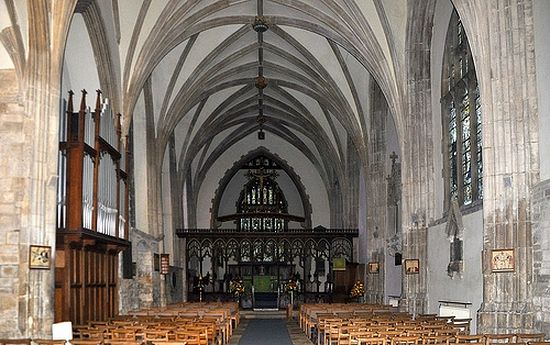 Inside the Crowland Abbey
Inside the Crowland Abbey
Veneration for St. Guthlac flourished throughout the Middle Ages. The Abbey of the Virgin Mary, St. Bartholomew and St. Guthlac grew into a large and prosperous monastery which every year received thousands of pilgrims who venerated the relics of St. Guthlac and other saints that were kept there, with countless cases of miracles. In the 9th century King Wiglaf of Mercia and Archbishop Ceolnoth of Canterbury (as writes David Farmer) especially venerated Guthlac who cured the latter from ague. In about 870 the pagan Danish invaders attacked Crowland Abbey and looted it, killing the Holy Abbot Theodore (whose head is kept and venerated in the Abbey Church of Crowland to this day) with many monks when they were serving the Liturgy and since then all of them have been venerated as martyrs.
However, in the following century the abbey was restored by the saintly Abbot Thurketyl (of Danish origin: 787-875, feast—July 11) who at the same time was its great benefactor. Soon afterwards both the popular and liturgical veneration of Guthlac spread all over England and petitions were offered up to him in all the dioceses of the English Church. At least nine ancient churches were dedicated to him and later a small Augustinian monastery in honor of Guthlac was founded in the city of Hereford. In 1136 the new translation of St. Guthlac’s relics into a richly embellished shrine took place (by that time, after 1066, Crowland had become Roman Catholic). The famous “Crowland Chronicle” was written by the monks of Crowland and was of a considerable renown. Notably, it was one of the abbots of Crowland, John Litlington, who founded Magdalene College in Cambridge in about 1428.
Sabine Baring-Gould (1834-1924: an Anglican priest from Devon and a hagiographer, hymnographer, novelist, researcher of English folklore, folk songs, lives of ancient local saints and medieval legends) wrote that St. Guthlac is considered as the spiritual father of the University of Cambridge. John Clare (1793-1864: an English poet who devoted his poetry mainly to nature) dedicated one of his sonnets to Crowland Abbey. The Abbey was always noted for its bells, and the first “tuned peal” in England was performed precisely in this Abbey.
Unfortunately, in 1539 by order of Henry VIII Crowland Abbey had been dissolved together with many other English monasteries and the relics of Guthlac were most probably destroyed. However, popular veneration for him has never ceased and in recent times he has been again been venerated by Christians of different denominations living in England. The present large Abbey Church of Crowland is a part of the original huge monastery church. The abbey is very attractive both inside and outside and, among other things, contains some medieval sculptures relating the life of Guthlac. Around the abbey there are ancient monastic ruins and the former west façade of the holy monastery.
Some Anglican churches (besides Crowland Abbey) are currently dedicated to Guthlac in the following places: Astwick in Bedfordshire, Branston in Leicestershire, Fishtoft in Lincolnshire (Fishtoft is situated on the site of one of the former isles of the Fens; the church tower has a medieval statue of the saint and ruins of the ancient priory cell can be found nearby), Knighton in Leicestershire, Little Ponton in Lincolnshire, Market Deeping in Lincolnshire, Passenham in Northamptonshire, Stathern in Leicestershire, Little Cowarne in Herefordshire. The Catholic Church of St. Mary and St. Guthlac is situated in the village of Deeping St James in Lincolnshire.
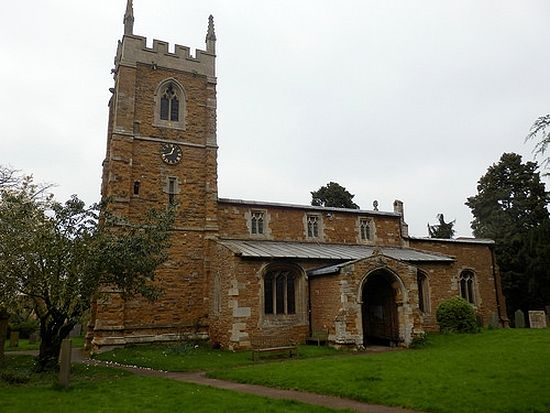 Church of St. Guthlac in Stathern, Leicestershire
Church of St. Guthlac in Stathern, Leicestershire
Holy Father Guthlac, pray to God for us!

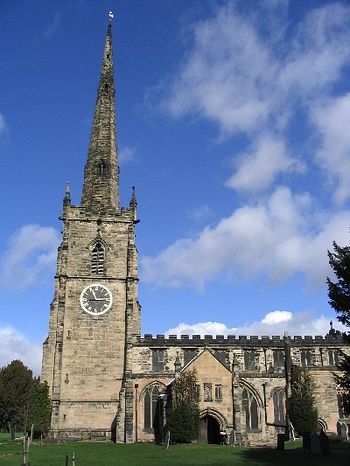
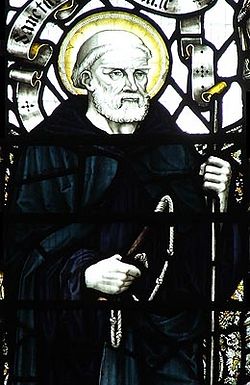
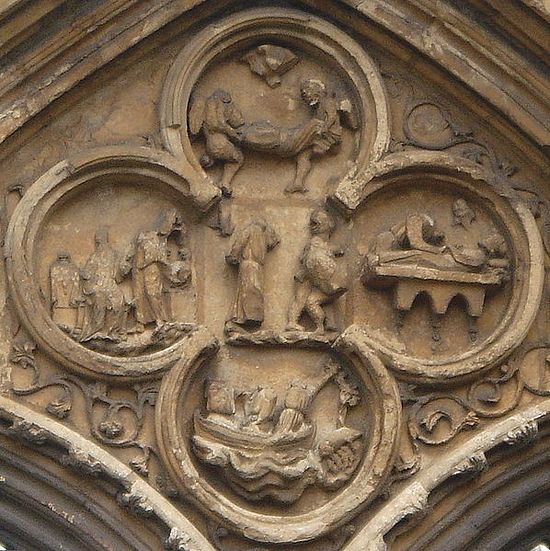
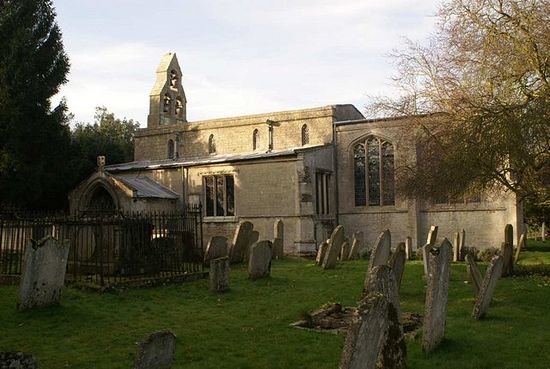
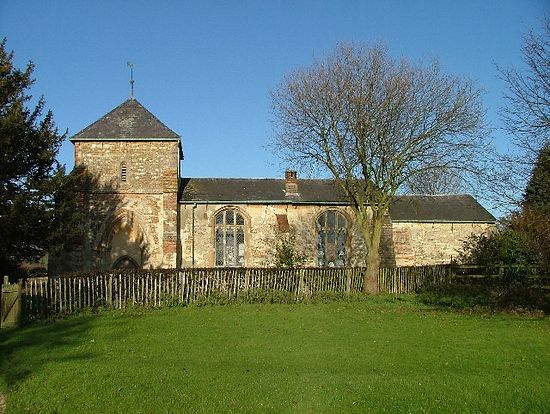
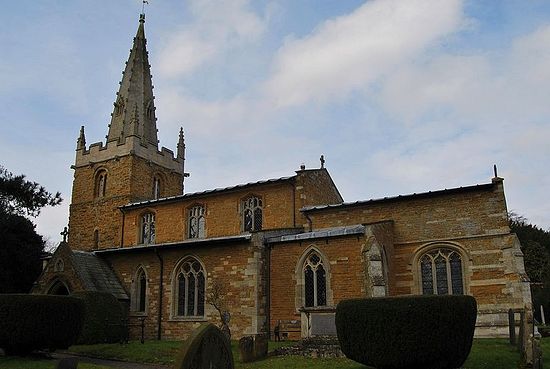
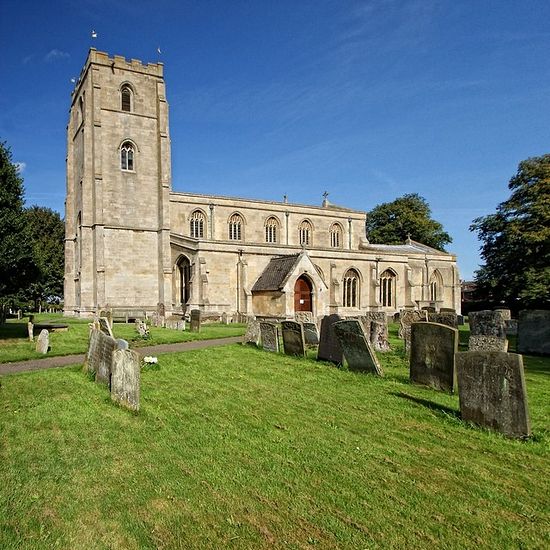
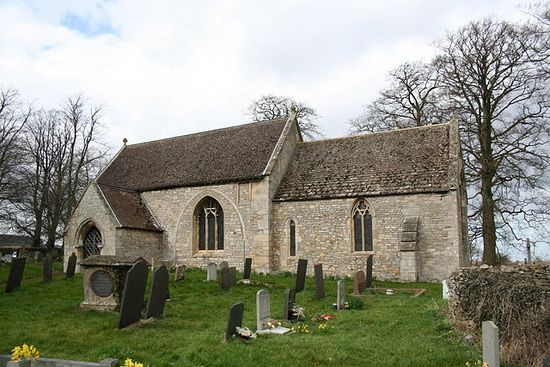
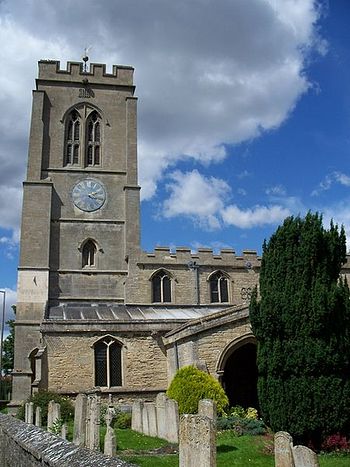
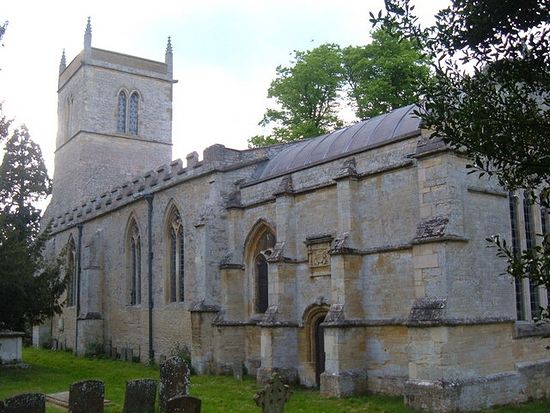
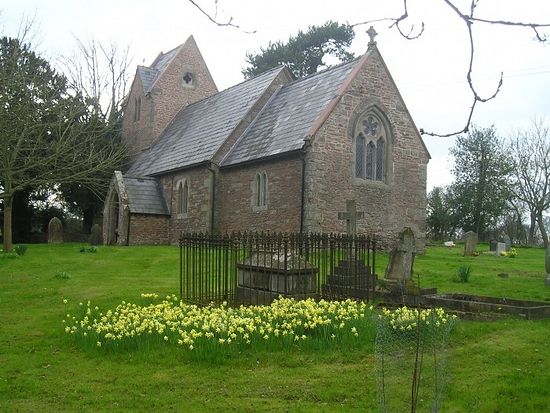
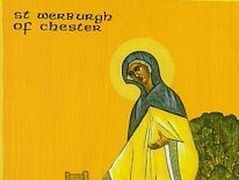
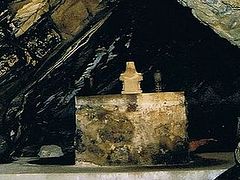
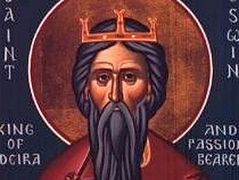
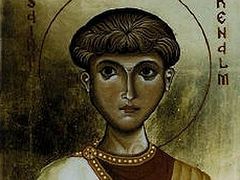
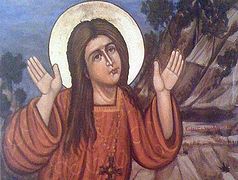
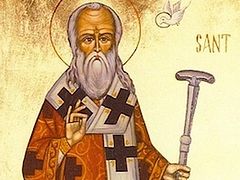
I've long been fascinated by the Anglo-Saxons, a unique culture, distinct in many ways from the continent, and so rich in Christian life and teaching, from those dwelling apart like Guthlac to scholars like Bede, missionaries to the Germanic peoples and so on.
Early in my Orthodox life we had a resident iconographer at our parish, and she did an icon of Guthlac for me. One of my most prized possessions!